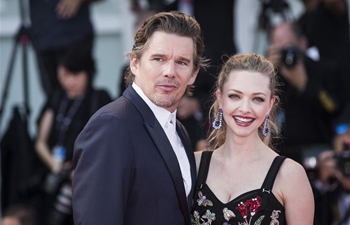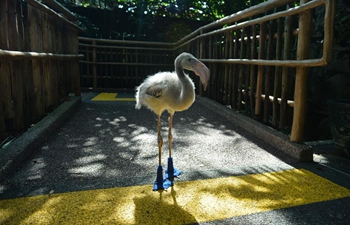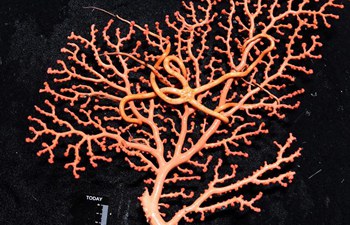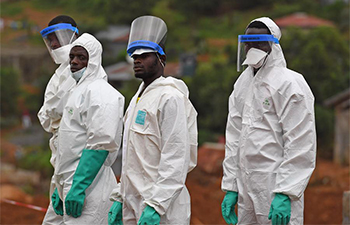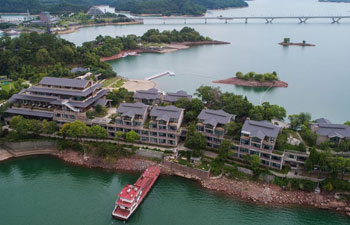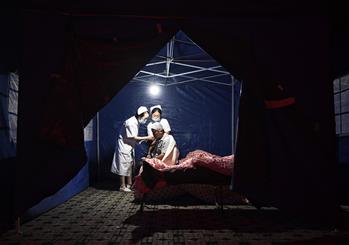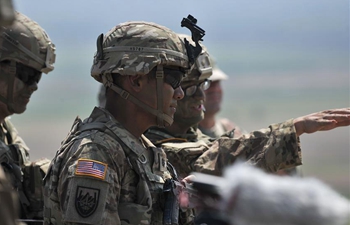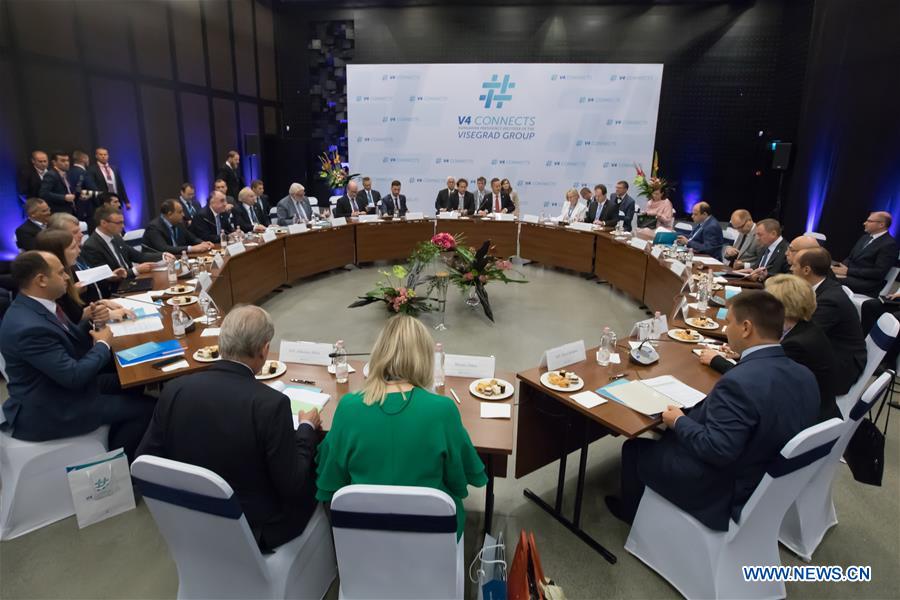
Ministers and other politicians from the Visegrad Four (V4) countries (Czech Republic, Hungary, Poland and Slovakia) and those of the Eastern Partnership countries (Ukraine, Belarus, Georgia, Azerbaijan, Armenia and Moldova) attend a meeting in Budapest, Hungary, on Aug. 31, 2017. The European Union's (EU) Eastern partners look forward to the upcoming EU-Eastern Partnership summit in November in Brussels, and can rely on the full support of the Visegrad Four (V4) countries - Poland, Czech Republic, Hungary and Slovakia - according to leaders of the concerned countries who met here on Thursday. (Xinhua/Attila Volgyi)
BUDAPEST, Aug. 31 (Xinhua) -- The European Union's (EU) Eastern partners look forward to the upcoming EU-Eastern Partnership summit in November in Brussels, and can rely on the full support of the Visegrad Four (V4) countries - Poland, Czech Republic, Hungary and Slovakia - according to leaders of the concerned countries who met here on Thursday.
"The V4 countries attach strategic importance to the Eastern partnership of the EU," the Hungarian Minister of Foreign Affairs and Trade Peter Szijjarto declared at a joint press conference following the meeting of ministers and politicians from Ukraine, Belarus, Georgia, Azerbaijan, Armenia and Moldova besides those of the V4 and the representative of Estonia.
Estonia holds the presidency of the Council of the European Union for the first time in the second half of 2017.
Szijjarto called for the adoption of a most ambitious and brave alliance at the Summit of the EU and the Eastern Partnership countries, to be held in Brussels in November.
"The V4 will stand against the reduction of the support for the Eastern Partnership programs in the next seven year budget of the EU," Szijjarto underlined.
He said that the countries of the Eastern partnership were of strategic importance for the EU, because they could "help block the migration process and provide easier access to the Far East markets."
"By building a Europe-friendly alliance system, we strengthen our relations with countries that can prevent the spread of extreme ideologies that are the basis of terrorism," he added.
Szijjarto listed the visa waiver program with Ukraine and Georgia, and the free trade agreement with Ukraine as important achievements so far. Speaking about energy security considerations, he pointed out that connecting the southern gas corridor and Central Europe was unthinkable without the Eastern partners.
Polish Foreign Minister Witold Waszczykowsky was hopeful that the Heads of State and Government of the countries concerned would support the further developing of relations with the Eastern Partners at the Brussels summit in November.
"Citizens of Moldova, Georgia and Ukraine can enter the EU without visas, I hope that in the near future other citizens will also be able to take advantage of this opportunity," Waszczykowsky declared.
Ukrainian Foreign Minister Pavlo Klimkin called the partnership a sign of European solidarity.
An important moment will be when Ukraine's Association Agreement comes into force (this Friday) because "we are going to the European future despite Russian aggression," he said. The politician termed the meeting as "fruitful", where they discussed what to do before the November summit.
"For Ukraine, Moldova and Georgia, this is the road that leads to EU membership," he stressed. He underlined that his country wanted to build a European society, wanted to break all barriers between his country and the EU.
Slovak State Secretary for Foreign Affairs, Lukas Pariz, emphasized the importance of cooperation. In November, the EU will also deal with the Eastern Partners, give them visions and develop cooperation, he said.
"It is necessary for the EU to provide concrete steps for the Eastern Partnership countries," he said, adding that the six partner countries have confirmed to fulfill the reforms undertaken.
Foreign Minister of Azerbaijan Elmar Mammadyarov declared that his country was focusing on questions concerning trade, education and democracy but was also interested in the southern gas corridor, which could supply about 20 percent of the need for natural gas of the EU. He also spoke of the importance of global security policies, as "Four of the six partner countries were participating in different conflicts."
Czech Foreign Minister Petr Gajdusek explained that although the objectives and opportunities of the Eastern partners had to remain the same, the EU should adopt an individual, tailor-made approach, taking into account the differences between the given countries.
Mikheil Janelidze, Foreign Minister of Georgia was glad to announce that his country had been the cooperating partner of the EU since four years, and his citizens enjoyed a visa waiver program, but underlined that the final goal of Georgia was full membership.
The representative of Armenia told that his country has been an active part of the Eastern partnership whereas the Deputy Foreign Minister of Moldova Daniela Morera explained that her country had chosen the European model of development.
Finally, the Foreign Minister of Belarus Uladzimir Makei deemed the cooperation of his country with the EU in the fields of the economy, the energy and the transportation of the utmost importance, and called for the deepening of these ties.





